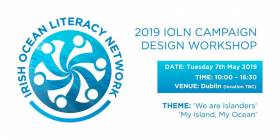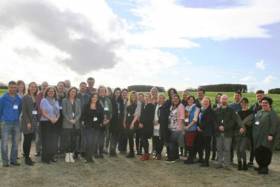Displaying items by tag: Irish Ocean Literacy Network
Is Ireland “ocean literate”? Tireless campaigners for better awareness of our impact on our marine environment may not be so sure, but Galway-based scientist Dr Noirín Burke is ever optimistic.
Dr Burke is director of education at Galway Atlantaquaria in Salthill, and her infectious enthusiasm for life on the shoreline has inspired several generations of young visitors since she took up that post.
However, Dr Burke is also co-secretariat of the Irish Ocean Literacy Network which is preparing for a number of events next month as part of European Maritime Day.
European Maritime Day
The programme ranges from an EU blue schools workshop on May 17th to an ocean literacy communications event hosted by Sea Search Ireland and Galway Atlantaquaria, to the first ocean literacy festival.
 Dr Noirin Burke and her daughter Roisín on Grattan Beach, Galway
Dr Noirin Burke and her daughter Roisín on Grattan Beach, Galway
On May 20th, the Irish Ocean Literacy Network will also host a workshop with speakers including Patrícia Conceição, Directorate-General for Maritime Policy, Portuguese Blue Schools (Escola Azul); Easkey Britton, world-renowned surfer, marine social scientist and writer; Nicola Bridge, President, European Marine Science Educators Association and Nathalie Van Isacker, EMODnet Secretariat, European Atlas of the Seas
Wavelengths interviewed Dr Burke (below)to hear details about the network, about her own work, about European Maritime Day, and about one of her favourite coastal locations – Galway’s Grattan beach.
The Irish Ocean Literacy Network (IOLN) has issued its final call for a workshop in Dublin next Tuesday 6 May on how to design and develop an environmental awareness campaign.
The IOLN Design Workshop under the theme ‘We are islanders … My island, my ocean’ is being run with support from the SFI MaREI Centre, DCU Water Institute and AquaTT.
Members and interested parties are invited to join a ‘day of inspiration’ at the brainstorming and co-creation workshop for designing and developing a national campaign, working with a host of artists, storytellers and marketeers.
The morning session will be dedicated to sharing ideas, defining campaign strategy and drafting storyboards for campaign content.
The afternoon session will bring together graphic designers, professional science communicators and educators to work together to co-design and create campaign assets for different channels and mediums.
Further design and development will follow after the event in the run-up to launching the campaign next month, with a view to linking it with World Ocean Day on 8 June or SeaFest 2019 in Cork on 7-9 June.
The workshop is free for members of the IOLN, which extends a special welcome to science communicator and those with expertise and an interest in storytelling, animation, graphic design, visual scribing/graphic facilitation, videography, digital marketing and social media campaigns.
For more details and how to book your place, visit the Eventbrite page HERE.
Irish Ocean Literacy Network Meeting Shapes The Conversation About Our Oceans & Human Health
The Irish Ocean Literacy Network held its sixth national meeting last Wednesday 20 February at the Marine Institute in Galway, where keynote speakers Dr Easkey Britton — surfer and post doc fellow at NUI Galway — and filmmaker Ken O’Sullivan of Sea Fever Productions spoke about the importance the ocean has on our lives as islanders.
Speaking at the event as chair, Cushla Dromgool-Regan of the Marine Institute welcomed having two distinguished guest speakers, highlighting the importance of recognising Ireland’s rich maritime heritage and being able to share our stories.
“As an island nation we are extremely lucky to have a wealth of experts from all walks of life willing to share their experiences with the wider marine community,” she said.
“From being able to see a whale and its calf close up in Irish waters through Ken’s film work, to watching children learning to surf for the first time with Easkey, reminds us of the diversity and importance of our maritime heritage and looking after our ocean for future generations.”
Easkey Briton is widely recognised for her international achievements in surfing is currently completing a post-doctoral research fellow with the EU-Horizon 2020 project Seas, Oceans and Public Health in Europe (SOPHIE).
Growing up in a family of surfers, Easkey talked about how her life passion for the water has brought her in a full cycle, where much of her research as a social scientist has been about the environment and society.
“Bringing people together through community outreach to working with a range of stakeholders in my current research highlights how we all value the ocean in different ways, yet together we all seem to understand the importance of linking our ocean with human health,” Easkey said.
Filmmaker Ken O’Sullivan also spoke at the event sharing his love of the ocean. Coming from a family of fishermen and then learning to dive opened up a new world of discovery for Ken at a young age, where he stated “exploring the ocean as a child with no limitations was like living the life to what might be similar to Huckleberry Finn. Now making a career out of filming wildlife and creative documentaries in the most extreme environments has been a life of adventures.”
Ken O’Sullivan set up Sea Fever Productions in 2006 with Katrina Costello to produce wildlife and creative documentaries. In 2018 they produced Ireland’s Deep Atlantic, a hugely ambitious ocean natural history series searching for blue whales and cold water coral reefs in the deep waters of the North Atlantic, documenting habitats and whale and shark behaviour for the first time ever.
“I have worked with a range of people who have contact with the ocean from fishermen, whale watchers to marine researchers and scientists during their deep sea expeditions, [and] coupled with the development of filming technology, [it] has provided an incredible opportunity to capture footage of marine life right at our doorstep,” Ken said.
“The feedback from the public who have seen my work has been extremely rewarding, particularly from those who are seeing marine life in Irish waters for the first time.”
With a wide range of ocean champions promoting ocean engagement across the island of Ireland, the Irish Ocean Literacy Network says it has seen a significant growth in the last six months, with nearly 100 members representing individuals, small businesses, outreach and education specialists, researchers, NGOs, State agencies and Government departments throughout Ireland.
Garry Kendellen, secretariat of the network, said: “With the recent growth of the IOLN membership, it is encouraging see a sense of the ocean community in one room.
“Our network is a truly eclectic mix of people, who share a similar passion for the ocean. From community outreach to larger national collaborations, it is great to see so many members willing to share their experiences with the network, providing advice and inspiring new collaborations and ideas.”
During the strategic workshop run by David Murphy of AquaTT, he noted: “As an island nation we are in a unique position to help contribute to the national and international efforts to increase peoples understanding and engagement about the ocean.
“We are all individuals who bring something new to the network, yet working together as a collective highlights the importance of creating impactful actions and messaging promoting our ocean from coast to coast.”
The Irish Ocean Literacy Network holds four membership meetings per year where attendees are able to meet other ocean champions who are keen to raise awareness and engagement about the ocean in Ireland. Membership is currently free and if you are interested in learning more, contact [email protected].
The Marine Institute are funders of the Irish Ocean Literacy Network secretariat, which was awarded to Galway Atlantaquaria from 2018-2020. This aims to supports the institute’s Strategic Plan 2018-2022, Building Ocean Knowledge – Delivering Ocean Services, as well as the Government’s marine strategy Harnessing Our Ocean Wealth, whereby it aims to increase awareness of the value, opportunities and societal benefits of our ocean, as well as raising peoples engagement with the ocean.































































